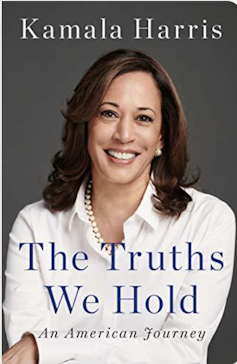What can we learn about Kamala Harris from her memoir?
- Written by Dennis Altman, Vice Chancellor's Fellow and Professorial Fellow, Institute for Human Security and Social Change, La Trobe University

As critics line up to suggest Kamala Harris is unqualified to be President of the United States[1] one wonders if any of them have actually read her memoir. The team at Sky News seem to largely base their analysis on her somewhat raucous laugh[2]. But The Truths We Hold: An American Journey, first published in 2019, charts Harris’s time as a state prosecutor and senator, allowing her to claim some significant policy achievements.
It is apparently compulsory for any American politician with national ambitions to write a biography, a temptation that in most cases should be resisted. Not surprisingly, Harris’s book has leapt up the bestseller lists[3] since she was effectively nominated as Biden’s successor, competing with JD Vance’s Hillbilly Elegy[4] for sales.
The Truths We Hold is a more political manifesto than Vance’s book, written when Harris was already thinking of national office. It is therefore less revealing, although it stands up well in comparison with Hillary Rodham Clinton’s, 2013 offering, Hard Choices[5].
Read more https://theconversation.com/what-can-we-learn-about-kamala-harris-from-her-memoir-235690

















